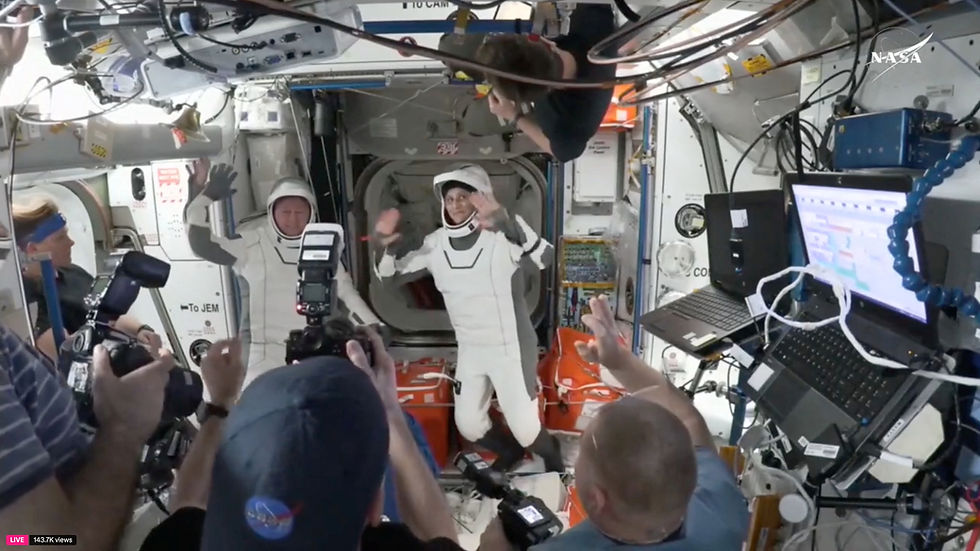Explainer-Why is Russia holding nuclear exercises - and what to watch for?
- News Agency
- May 15, 2024
- 3 min read

MOSCOW - Russian President Vladimir Putin has ordered his military to practise the deployment of tactical nuclear weapons after what Moscow said were threats from France, Britain and the United States.
Why, and what will happen?
WHAT DRILLS WILL TAKE PLACE AND WHERE?
Russia's defence ministry said missile forces in the Southern Military District will take part, together with aviation and the navy. The southern district, headquartered in Rostov-on-Don, lies alongside Ukraine and includes parts of Ukraine which Russia controls. Belarus will also be involved.
The Russian Foreign Ministry linked the drills to what it called "militant statements" by Western officials which it said created security threats for Russia. It specifically mentioned French President Emmanuel Macron, British Foreign Secretary David Cameron and the delivery to Ukraine of U.S. Army Tactical Missile Systems (ATACMS).
Macron has floated the idea of sending European troops to fight Russia in Ukraine while Cameron said that Ukraine had a right to use the weapons provided by London to strike targets inside Russia.
WHY IS THIS SIGNIFICANT?
All nuclear powers carry out routine nuclear exercises but it is extremely rare to explicitly link such drills in public to a current war as Russia did. It is unclear how much Russia will allow the outside world to see.
WHAT WILL HAPPEN?
Mock warheads will probably be taken out of storage and driven to a designated point where soldiers will train how to "mate" them with the aircraft or missiles that would be used to deliver them.
Russia has numerous weapons systems capable of delivering a tactical nuclear warhead - meaning one designed for use on the battlefield, as opposed to strategic warheads that could wipe out whole cities.
The U.S. and its allies will be watching closely which ones are involved. They could include Iskander, Kinzhal, Kalibr or Novator 9M729 missiles, and possibly air-dropped bombs, said William Alberque of the International Institute for Strategic Studies.
"The Kalibr Kh-102 is of great interest because the Kh-101 has been so comparatively easy for Ukraine to shoot down," said Alberque, who believes the war in Ukraine has increased the importance to Moscow of tactical nuclear weapons as a means of deterring and defeating NATO.
WHAT IS PUTIN SAYING?
"This is a clear case of nuclear signalling," said Matt Korda, senior research fellow for the Nuclear Information Project at the Federation of American Scientists.
"Russia's nuclear signalling in the context of its invasion of Ukraine has been designed to deter conventional invasion by NATO and long-range strikes into Russia."
Pavel Podvig, director of the Russian Nuclear Forces Project, said: "This is supposed to be a signal to the West, probably to make people stop thinking about deeper involvement in the war. But I believe we can be quite confident that it is not a threat to use nuclear weapons in Ukraine or against Ukraine."
Nikolai Sokov, a former Soviet and Russian arms control official, said the message was intended for NATO, Europe and particularly France.
"They (Russia) felt it necessary to invoke nuclear weapons as a signal that the move, about which Macron has been talking, may result in escalation up to the nuclear threshold," said Sokov, a senior fellow at the Vienna Center for Disarmament and Non-Proliferation.
He said Russia had sent a previous signal when it announced the deployment of tactical nuclear missiles to Belarus last year, but this was "all but ignored" by the West.
WILL RUSSIA USE NUCLEAR WEAPONS?
A senior Russian source who spoke on condition of anonymity said the signal was meant to make the West afraid and to deter the United States and its European allies from a potentially catastrophic escalation over Ukraine.
The source said that the West's declared aim of defeating Russia on the battlefield could trigger a nuclear scenario.
"You are making a grave mistake if you dismiss such signals," the source said. "Russia will not be defeated."
Christopher Chivvis, Senior Fellow and Director of the American Statecraft Program at the Carnegie Endowment for International Peace, said: "Putin is reminding the world that Russia is a nuclear power and indicating that he might be willing to use nuclear weapons in the war in Ukraine.
"He is not saying that he is about to do so, but warning that there are some conditions under which he would do so," said Chivvis, a former U.S. intelligence official.
"It seems unlikely Russia would use such weapons offensively to make gains on the battlefield. More likely, they would use them defensively in a situation where Russian forces were rapidly retreating and significant losses seemed probable."
Source: Reuters









.png)








Comentarios